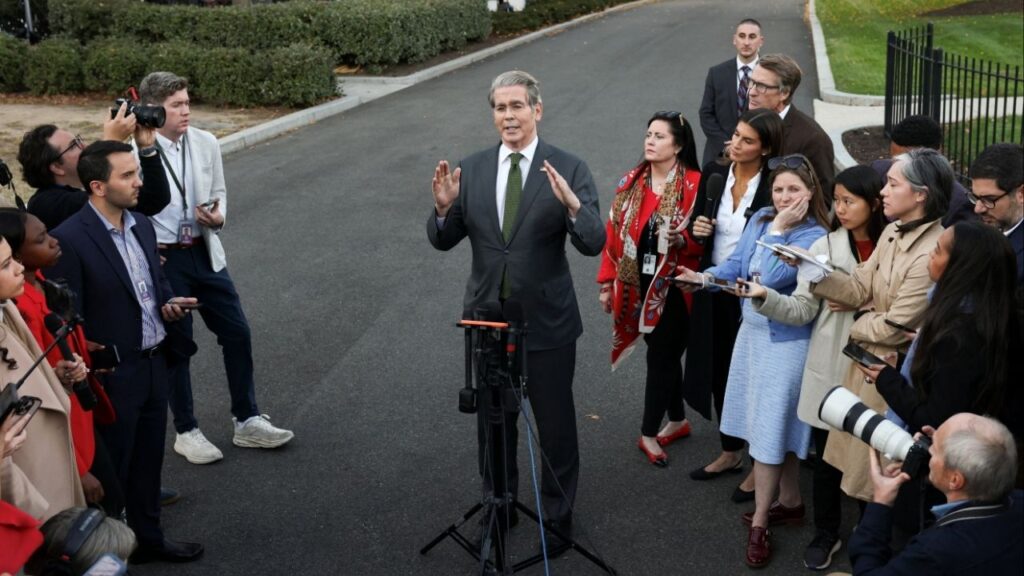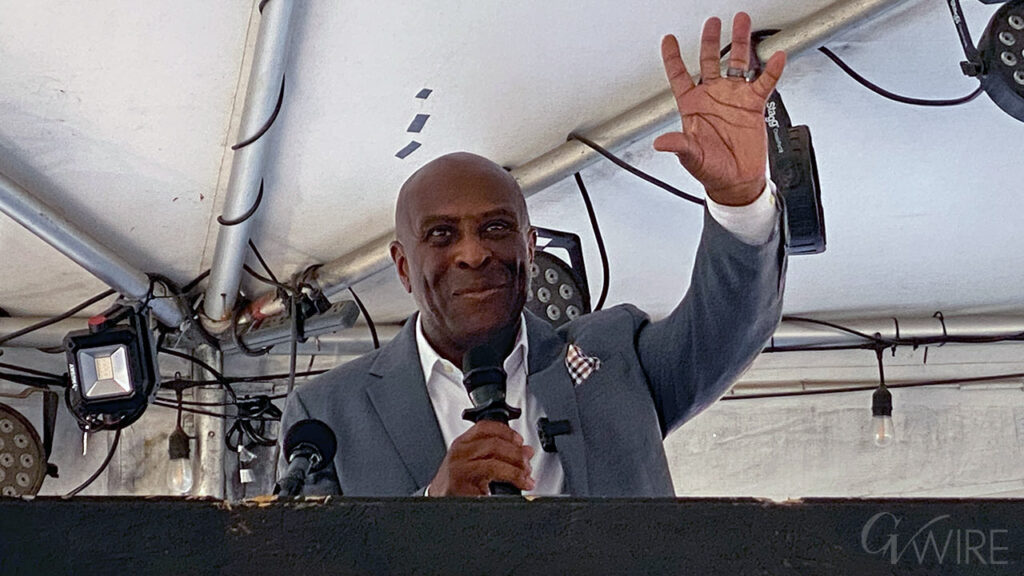House Speaker Mike Johnson (R-La.), right, huddles with Rep. Jodey Arrington (R-Texas), chairman of the House Budget Committee, as they depart a meeting of House Republicans at the Capitol on Thursday, May 15, 2025. In the latest indication of the dissent in the GOP’s ranks, two Republicans, Reps. Ralph Norman (R-S.C.) and Chip Roy (R-Texas) told reporters they plan to vote against approving the tax and budget legislation in the Budget Committee in a session planned for Friday. (Al Drago/The New York Times)

- Reps. Chip Roy and Ralph Norman plan to vote against the legislation in the Budget Committee, potentially blocking its advance.
- Conservative lawmakers argue the bill fails to significantly cut spending and adds billions to the federal deficit.
- House GOP leaders face a difficult balancing act trying to satisfy conservatives and protect vulnerable members.
Share
WASHINGTON — Conservative Republicans in the House were in open revolt Thursday over their party’s major legislation to deliver President Donald Trump’s domestic agenda, threatening to derail the tax and budget measure over concerns that it would add too much to the deficit.
In the latest indication of the dissent in the GOP’s ranks, two Republicans, Reps. Chip Roy of Texas and Ralph Norman of South Carolina, told reporters they planned to vote against approving the legislation in the Budget Committee in a session planned for Friday.
Roy’s and Norman’s opposition alone would be enough to block the measure from reaching the floor, upending the party’s drive to push the legislation through the House before a Memorial Day recess. A number of other conservative, anti-spending Republicans sit on the panel and suggested they could follow suit.
“Right now, the House proposal fails to meet the moment,” Roy said. “It does not meaningfully change spending. Plus, many of the decent provisions and cuts don’t begin until 2029 and beyond. That is swamp accounting to dodge real savings.”
Growing Conservative Opposition
As the day began Thursday, Roy was alone in declaring his intention to tank the bill in committee — a declaration that came roughly half an hour after the Texas Republican entered a meeting in Speaker Mike Johnson’s office meant to assuage holdout lawmakers.
But by the afternoon, a growing number of Republicans on the panel were venting their frustrations with the measure, and it appeared that House GOP leaders lacked the support, for now, to push the legislation carrying Trump’s domestic agenda over its next hurdle.
“It’s clear we don’t know the true cost of this bill or whether it adheres to the Budget blueprint,” Rep. Josh Brecheen of Oklahoma wrote on social media. “We have a duty to know the true cost of this legislation before advancing it. If we are to operate in truth, we must have true numbers — even if that means taking some more time to obtain that truth.”
Another, Rep. Glenn Grothman of Wisconsin, declined to say how he planned to vote in committee but said the legislation “doesn’t seem that sincere” in its efforts to cut spending.
Demands for Immediate Spending Cuts
The bill would extend Trump’s 2017 tax cut and temporarily enact his campaign pledges not to tax tips or overtime pay. Cuts to Medicaid, food stamps and subsidies for clean energy would partly offset the roughly $3.8 trillion cost of those tax measures, as well as increased spending on the military and immigration enforcement.
Republicans like Roy are demanding changes to the bill, arguing that their leaders did not go far enough to cut federal spending. Some had earlier insisted that the final product add nothing to the deficit. The Committee for a Responsible Federal Budget, a nonpartisan group that calls for lower deficits, estimated that the bill would add roughly $3.3 trillion to the deficit over the next decade.
They are also unhappy that a number of the provisions in the legislation to cut spending — chief among them a measure imposing work requirements on childless Medicaid recipients without disabilities — would not kick in until 2029.
“On Medicaid work requirements: Start ‘em now,” Rep. Scott Perry of Pennsylvania wrote on social media. “The American People are sick of half measures. Some of my congressional colleagues want to do anything but LEGISLATE…”
Republican leaders had toiled to structure the legislation to protect their most politically vulnerable members from accusations that the party was moving to gut popular health care programs like Medicaid. They stopped short of a structural overhaul that would have made deep cuts to the program.
House Republican leaders were discussing rewriting the work requirements so they would take effect sooner in a bid to appease conservatives. But it is a treacherous balancing act for Johnson, who must try to satisfy his most conservative members agitating for significant spending cuts, and his swing-seat members who say voting for legislation taking an ax to widely used federal programs would send them to an early political retirement.
He was sanguine emerging from the meeting in his office Thursday.
“Not everybody’s going to be delighted with every provision in a bill this large, but everyone can be satisfied, and we’re very, very close to that,” Johnson told reporters.
But conservatives such as Roy are not the only Republicans who have concerns about the legislation.
A small group of Republicans from New York and California are threatening to torpedo the bill over the state and local tax deduction. Others have called on Republican leaders to kill some of the most aggressive provisions in the legislation roll eliminating clean energy tax credits.
And even if the House can clear the legislation, a number of Republican senators have been unsparing in their criticism of the bill and suggested they would want to impose significant changes.
Procedural Path Blocked
But first, the legislation must clear the Budget Committee.
The panel’s role is mainly procedural but very significant for complying with the special reconciliation rules that protect the legislation from a filibuster in the Senate. The committee is responsible for merging the legislative proposals produced by 11 committees who have written various pieces of the reconciliation package into a single bill and sending it to the House floor through the Rules Committee.
Members of the Budget Committee don’t have the power to make any changes to the legislation at this point, but they must approve it to allow the bill to move forward.
With Democrats unanimously opposed, Republicans on the panel need almost unanimity to make that happen.
Any attempt to skirt the committee could lead to trouble in the Senate even if the House were to approve the bill. The reconciliation rules require that the measure be a product of the Budget Committee for it to qualify for a majority-only vote. Working around the Budget Committee could violate that rule and allow Democrats to filibuster the legislation, effectively killing it.
—
This article originally appeared in The New York Times.
By Catie Edmondson, Michael Gold and Maya C. Miller / Al Drago
c. 2025 The New York Times Company



















